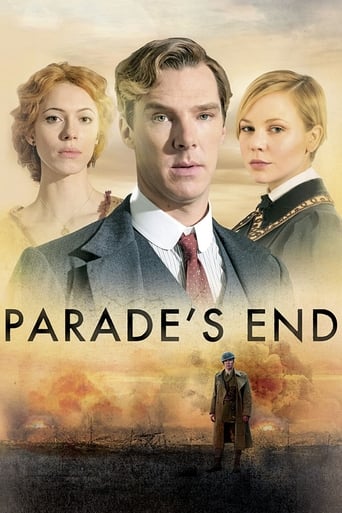geoffreybrooks
This vote is partial and based on seeing the first two episodes this month (October 2015) on Argentine cable TV (Film & Arts). Therefore it is not a full opinion. I have enjoyed the acting and storyline very much so far.I have two criticisms which may be the fault of the author of the book on which it is based or failing to consult military authorities.(1) Trench warfare was resorted to at the end of 1914 and not at the outbreak of war. Initially the fighting was mobile. The belligerents only dug in once they realized the scale of their losses and had become exhausted.(2) In the British Army, nobody ever salutes anybody else when not wearing headgear. Having had that drilled into me as a young man fifty years ago I found that to be an irritating error.
rahulgreenday8
Christopher Tietjens is a man of immense character. He does what is right and what tradition demands of him. He is the sort of person you can expect to back upon, whether one is cheating wife, an untrustworthy friend or a fellow soldier. The plot revolves around what are his limits, how much can he bear his cheating wife, how much can he trust his emotions about a simple minded sorta rebellious girl who makes an unexpected arrival in his life. After all he is the last man at the end of parade of honorable men. Damn if he does damn if he don't. Watching this series is like reading the book. You want to keep it down because it may not go where you expect or want to go but you want to know how much Tiejens can take it further. You feel sorry for the fellow. It does justice to the book. Acting is brilliant, characters do come to life especially of Silvia who is played by Rebecca Hall, Benedict is awesome as he usually is. Pace is very slow but it does capture the emotion behind the plot. I Would recommend you to watch it if you haven't read the book.
maria-prokaeva
I had mixed feelings when I started watching the BBC drama. Having read some comments I had some fears. One of them was that I expected the series to be some kind of copy-paste of Downton Abbey. It wasn't. It is more subtle, evolves more slowly and has an almost inaudible air of pain and suffering. I couldn't help but compare it to Maughem's "The Painted Veil" that tells the story of a couple - a flippant wife of a doctor who is intellectually superior to her but too noble and and at the same time too proud to divorce her for betrayal. This story might seem similar however it has a greater depth. It's not only a man's parade trying to stand for what he truly believes in and finding himself abandoned by life and failing as a man. It's a vivid portrayal of virtues that are believed to be outdated but are in fact so modern and thoroughly relevant to today. And that's what salvages these series from being just another costume drama.What surprised me most about the drama was Benedict Cumberbatch's performance. He has an incredible acting prowess to play roles that are so different from him. There is no Benedict neither in Sherlock nor in Mr Tiejens. He completely vanishes within the characters he plays altering his movements, speaking, laughing, joking etc. It's interesting to note what Benedict said speaking about the role "Christopher has many admirable qualities I'd like to siphon off into my life." I believe Mr Tiejens is one of Benedict's best roles. He uses his voice like an instrument tuning it sometimes so deep and strong and sometimes subtle and gentle. It's an astonishing performance that definitely transcends TV dramas.
jc-osms
I read Ford Madox Ford's most celebrated novel "The Good Soldier" only last year and came to this dramatisation of his "Parade's End" with a good degree of expectation, tempered by some reservations about the anticipated over-writing by Tom Stoppard in bringing it to the small-screen. Reservations because I knew in advance that every character would be miraculously blessed with extreme loquaciousness, with almost no room for the plain everyday conversation that surely made even the Edwardian world go round, particularly in the trenches. Thus even ordinary soldiers in the heat of battle boast about their skill in translating sonnets into Latin pentameter, that most mundane of talents! At another point, Benedict Cumberbutch's Christopher Tiejens' character's young lover Valentine declares that their love is "like literature", which was probably the most opaque of a whole army (pun intended) of similarly opaque phrases proffered here.As for the characters, I found them too many and too shallow and callow. I couldn't imagine cold-fish Tiejiens having an impulsive stays-busting romp in a train carriage with the venal but voluptuous Victoria, who, we learn later, uses her soon-afterwards child-birth as the means to trap him into marriage, for a child who isn't his. Other characters come and go, a mixture of the snobbish, the eccentric and the parasitic, individuals amongst them often re-emerging at the least expected moment, which for my money didn't help the narrative.Acting wise, I found Cumberbutch underwhelming as the central character in the drama. He can do stiff upper lip crossed with pained guilt but little in-between. Rebecca Hall as his harlot of a wife does better as the promiscuous go-getter while Adelaide Clemens as his too obviously boyish-looking suffragette mistress never once appears natural and likewise fails to project her grand passion which supposedly outlasts the war.The war scenes themselves are magnificently rendered in their realism and horror. I just wish that some of that realism had extended deeper into this drama of upper-class nabobs the likes of which I couldn't give a damn about.




